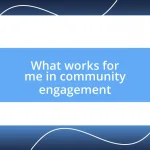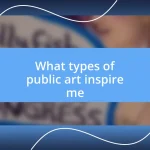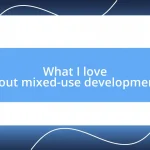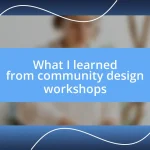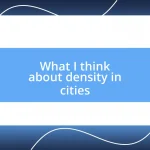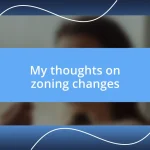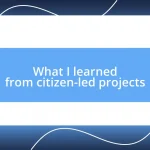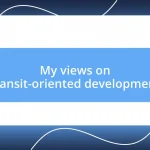Key takeaways:
- Engaging with history enthusiasts through online forums, local groups, and social media fosters a sense of community and shared passion for historical narratives.
- Attending history events and conferences creates unique opportunities for networking and collaboration, enhancing one’s understanding and appreciation of history.
- Blogging and forming study groups promote knowledge-sharing and deep discussions, allowing individuals to explore diverse historical perspectives together.

Connecting with History Enthusiasts
I remember the first time I stumbled upon an online forum dedicated to historical discussions. It felt like finding a hidden gem in a vast digital landscape. The excitement of exchanging ideas with people who shared my passion for history was invigorating; it was a reminder that I wasn’t alone in my love for forgotten stories and ancient battles.
One thing I’ve noticed is that history enthusiasts often have unique perspectives shaped by their backgrounds. Have you ever listened to someone recount a historical event from their family heritage? It’s fascinating how personal narratives can breathe life into dates and places, transforming them into a shared experience. I had a vivid conversation with a fellow history buff who traced his lineage back to a Civil War soldier. His emotions while recounting those tales took me back in time; I could almost visualize the struggle and triumph.
Meeting up with history buffs in person was another rewarding experience. I attended a local reenactment event, and as I chatted with other attendees, I was struck by how quickly we connected over our favorite historical figures. It was as if we were all part of a secret club where every shared laugh and enthusiastic debate pulled us closer. Isn’t it incredible how history can forge friendships that transcend the bounds of time and geography?

Finding Local History Groups
Finding local history groups can be an adventure in itself. I recall my excitement when I first attended a heritage festival in my town. I met several history enthusiasts who were not only well-informed but also friendly and eager to share tales about our local past. Those moments of discovery have helped me appreciate the rich tapestry of history right in my own backyard—have you experienced something similar?
Another avenue I explored was community centers, which often host history clubs or discussions. I remember walking into one meeting and feeling an instant camaraderie. Everyone was so supportive, exchanging ideas and suggestions on where to find resources. It’s enlightening to hear different interpretations of historical events; sometimes, it can change the way you view a topic entirely.
I also found success with social media, particularly local history pages. Connecting with fellow buffs online has led to numerous meetups, where we’ve ended up visiting historical sites as a group. One time, our group decided to have a picnic at a Civil War battlefield. Sharing food and stories in such a significant place created bonds I never expected. It’s amazing how history can serve as a backdrop for community-building.
| Method | Benefits |
|---|---|
| Heritage Festivals | Camaraderie and local stories shared. |
| Community Centers | Supportive environment for discussion and learning. |
| Social Media | Easy to organize meetups and explore historical sites. |

Utilizing Social Media for Connections
Connecting through social media has truly revolutionized how I engage with fellow history enthusiasts. I vividly recall joining a Facebook group focused on medieval history. The day’s conversations would start to unfold as I sipped my coffee, sharing insights about everything from the significance of the Magna Carta to lesser-known battles. It felt like a daily history class where everyone contributed, and suddenly, I felt like I was part of a global discussion about the past.
Here are a few ways I’ve utilized social media to forge connections:
- Discussion Forums: Platforms like Reddit allow for in-depth discussions that bring out diverse opinions and interpretations.
- Live Streams and Webinars: Joining history-focused live streams lets me interact with historians and ask questions in real-time, creating an engaging learning experience.
- Hashtags: By following specific hashtags like #HistoryNerd or #ThisDayInHistory, I’ve stumbled across amazing stories and met like-minded individuals who might share the same obscure interests.
Using social media as a tool, I not only expanded my knowledge but also formed genuine friendships. One time, I got into a passionate debate with a fellow member about the role of women in the Revolutionary War, which ultimately turned into an enriching discussion filled with resources and personal stories. It’s exhilarating how these interactions continue to spark my curiosity and deepen my understanding of history.

Participating in Online Forums
Participating in online forums has been one of the most rewarding aspects of my journey as a history buff. I remember one late night, scrolling through a forum dedicated to ancient civilizations, when I stumbled upon a thread discussing the fall of the Roman Empire. I dove into the conversation, sharing my thoughts on economic factors and cultural shifts. The thrill of exchanging ideas with someone from halfway around the world made me realize just how connected we all are through our passion for history.
I also appreciate the depth of knowledge present in these online discussions. One time, I posed a question about lesser-known historical figures, and the responses poured in like an unexpected flood. I found myself learning about fascinating individuals I had never even heard of! You might wonder why this matters, but the beauty of these insights is that they not only enhance our understanding of history but also enrich our lives with stories that are often overlooked.
It’s fascinating how online forums cultivate a sense of community among strangers. I will never forget the virtual book club I joined, where we dissected historical novels and their real-life inspirations. Our conversations sometimes ventured into personal reflections, and it was heartening to hear how certain historical narratives resonated with our own life experiences. Have you ever felt that connection? Those moments of shared passion reminded me that history is not just about dates and events; it’s about the human experience that links us through time.

Attending History Events and Conferences
Attending history events and conferences has opened doors I never anticipated. I still remember my first history conference; the buzz of excitement in the air was palpable. Mingling with fellow attendees, I found myself engrossed in conversations ranging from the industrial revolution to oral histories. Each discussion, filled with passion and varied perspectives, made me realize just how many different angles one could take when delving into the past. Isn’t it invigorating to share a love for history in such a vibrant setting?
One conference, in particular, stands out vividly in my memory. I attended a session on World War II, and the speaker was not only knowledgeable but deeply moved by the subject matter. After the talk, I approached him and shared my thoughts on lesser-known wartime stories. To my surprise, he invited me to join a small group of researchers for future discussions. Connecting with someone so passionate reignited my excitement for historical narratives and research. Have you ever had that moment where you realize your enthusiasm can lead to unexpected opportunities?
Moreover, these events foster a genuine sense of camaraderie. During lunch breaks, I often found myself at communal tables, swapping stories with fellow history buffs. One woman shared her experiences of visiting battlefields across Europe; her excitement was infectious. It struck me how history, though rooted in the past, continually brings people together in the present. In what ways have you found history to connect you with others? Those shared moments remind us that our passion for history isn’t just about learning; it’s about creating lasting connections with kindred spirits.

Sharing Knowledge Through Blogging
Blogging has become one of my favorite platforms for sharing historical knowledge and ideas. I started my history blog after a friend suggested it as a way to document my thoughts. It was a bit daunting at first, but once I shared my first post about the significance of the ancient Silk Road, I was pleasantly surprised by the outpouring of comments and insights from fellow enthusiasts. Have you ever hit “publish” and felt that rush of anticipation? The conversations that followed transformed my solitary research into a vibrant exchange of ideas.
One thing I love about blogging is the freedom to explore various historical topics without boundaries. I recall writing a piece on lesser-known women in history, and the feedback was phenomenal. Readers not only shared their views but also contributed their own stories. That collaborative spirit created a mini community where everyone felt valued. Isn’t it empowering to know that sharing one’s voice can inspire others to speak up too?
I cherish the moments when a fellow blogger reaches out to collaborate or simply discuss a shared interest. Last month, I teamed up with another history blogger for a joint series on medieval history. It was an exhilarating experience, blending our perspectives and crafting something unique together. Those connections remind me that blogging isn’t just about individual voices; it’s about building a collective narrative of our shared passion for history. Have you ever experienced that joy of collaboration? It truly highlights the beauty of knowledge-sharing in our digital age.

Creating a History Study Group
Creating a history study group can be one of the most rewarding endeavors. I remember the first time I suggested it to a few friends who shared my passion. We gathered at a local coffee shop, armed with books and a shared curiosity. The excitement in that small room was electric; discussing our favorite historical events made me realize how much deeper we could dive into topics when we pooled our knowledge. Have you ever experienced that moment when a simple idea transforms into something much more profound?
I quickly found that structuring our meetings made a huge difference. Each week, we would choose a theme, like the Renaissance or the American Civil Rights Movement, and come prepared to share insights or questions. I vividly recall our session on the Cold War. We not only examined textbooks but also analyzed primary sources, sparking debates that lingered long after we’d left the café. The clash of ideas and perspectives added layers to our understanding that I never anticipated. Isn’t it fascinating how collaborating with others can enrich your grasp of complex subjects?
One memorable night, we hosted a trivia game about historical events, and I was amazed at how competitive yet enjoyable it became. It ignited a spirit of camaraderie and sparked discussions about lesser-known events. That evening reminded me that learning doesn’t always have to be formal—sometimes, it’s about having fun together. In what ways do you think a study group could enhance your appreciation for history? Embracing that collective enthusiasm not only deepened our friendships but also solidified our commitment to exploring the past together.


